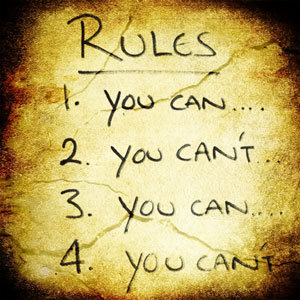Difference Between Rules and Laws

Rule defines a method of conduct, while laws are a collection of rules, and have to be followed under a specific system. When differentiating between rules and laws, there is a fine line which most often people difficult to perceive. There are however some parameters that can help you understand this difference.
Instructions
-
1
Consequences
The major parameter which differentiates rules and laws is consequence. The weight of law extremely significant as compared to the weight of rules as far as the consequences upon breaking them are concerned. When you break a rule, which isn’t a law, but more moral in nature, the consequences can vary but are generally mild in nature. However, if you break a law, the consequences can be severe, and legal.
Laws are enforced by the government authorities, and are written in such a way that can be interpreted under different situations. Rules on the other hand are more personal in nature, for e.g. rules of a baseball game or the ones set by your parents regarding your diet. -
2
Flexibility
Rules are flexible; laws are not.
Whenever a law is introduced, there is a whole history to it. The process starts off with a bill cum proposal, followed by lot of checks, discussions about consequences, penalties, before it eventually gets passed. Rules on the contrary, can be bent as per the specific situation. -
3
Exploitation
Most of the laws depend upon interpretation and can be exploited through proper litigation. Laws are not moral codes. They are legal in nature and there are always some fine details which can be exploited to determine the level of guilt.
For rules however, the guilt determination is either in the form of a yes or no. There is now way one can exploit a rule. These are the basic standard and also take morality into account. -
4
Moral Education
You will never hear teacher introduce a law in the classroom, it is always a set of rules. Rules help us learn about the emotional and moral aspect of life. They can be considered as a teaching medium, something which cannot be associated with the laws. -
5
Issuing authority
Laws are legal variant of rules, set by the government and there is whole system, including police and prosecution, to ensure that they are followed. Rules on the other hand are set by individuals and organization to cater for specific needs.





